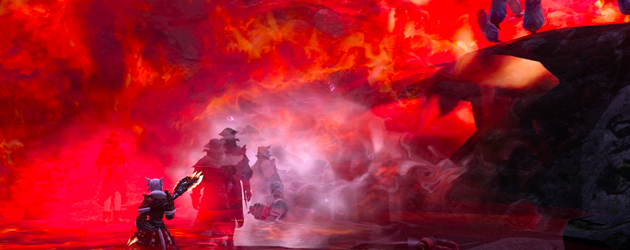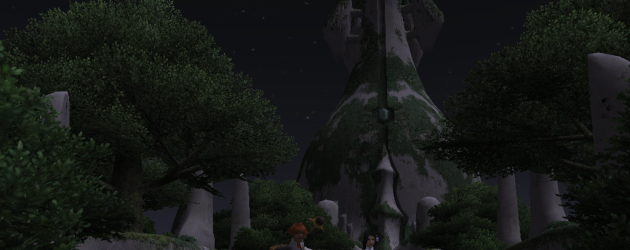A Look at the Razed and Reborn Realms of Eorzea

The death of an MMO, while uncommon, is not unheard of. The death and rebirth of an MMO is another matter entirely.
Certainly, some MMOs have seen drastic overhauls over the course of their lifespan: perhaps most notably, World of Warcraft with its Cataclysm expansion, which sundered and reshaped the old world, but kept the core gameplay systems intact. The now-defunct Star Wars Galaxies is probably the closest an MMO has come to being completely remade, but the update that did so, dubbed the New Game Experience, was much-maligned and arguably sent the game into a death spiral.
Even with the aforementioned games, though, their former lives continue on as specters in the shadowy underworld of private servers; it’s doubtful that anyone deemed Final Fantasy XIV worth the effort to reverse-engineer in a similar manner. It would be easy to think that a game judged so poorly by its developers that they opted to start from scratch had no redeeming qualities; however, before the original iteration of FFXIV was laid to rest by the fiery breath of a very large, angry dragon, it saw many updates developed concurrently to A Realm Reborn that set the stage for the new world and revamped some of the gameplay mechanics. Though aspects of that game will live on in A Realm Reborn, nothing will be exactly as it was; even if the challenging encounters were to be copied mechanic-for-mechanic, they would still ultimately play out much differently, not just because of a completely new combat system but also because they are no longer constrained by an engine that was being pushed to (and past) its limits.
So if Final Fantasy XIV 1.0 is truly dead and buried, we should acknowledge its failures, but also celebrate its successes. To that end, I thought it would be interesting to talk to a member of one of the most competitive end-game linkshells, Order of the Blue Garter, from the Rabanastre server. After all, if people were willing to dedicate themselves so deeply to a game with a known expiration date, there had to be something to it, right? Carraway Author, the member in question, was fantastic to talk to, so join us for a warm cup of nostalgia as we discuss not just the past and future of FFXIV, but also revisit our history with other MMOs and reflect on the expectations set by them.
Tell us about how you got your start with MMOs.
My first online RPG experience comes from MUDs — back in the days of AOL and 2400 baud modems. I racked up a lot of unfortunate bills on my parents’ credit card playing Gemstone III, typing “a rat” over and over again. I tried EverQuest when it came out, but the game was nigh-unplayable for me on what was then a 14.4kbps connection, and I canceled my trial after dying somewhere outside a city, disconnecting, coming back an hour later and being unable to find my corpse.
“Hardcore” MMO gameplay attracts a certain type of person. What drew you to that scene, and what keeps you involved?
WoW was the first game where I experienced what it meant to not just be a hardcore player, spending a lot of time with a game, but to be a hardcore endgame player. I never accomplished anything fancy in WoW, but in my mid-tier guilds I experienced the rush of that first Ragnaros kill, that first Nefarian kill, and most memorably our various Naxxramas kills. I spent hours in Orgrimmar with our healers theorycrafting our Patchwerk viability before we ever saw the fight; our rogues ran spreadsheets and fine-tuned our rotations; eventually, when we attempted Patchwerk, we wiped on two dry runs and killed it on the third pull.
I’ve always cared about my gameplay, but that was a major turning point for me. Since then, I’ve played other MMORPGs: Warhammer Online, Aion, TERA, Star Wars: The Old Republic, and now FFXIV. (I’ve also taken a second look at Final Fantasy XI, now that I know what I’m doing.) And with every game, I bring with me that attitude where it’s important to not just push buttons and grind away at goals, but do it to the best of my ability. And I’m spoiled; I only want to play alongside my peers: people who care about things like maximizing their DPS by a fraction of a percentile (or being able to beat Contra on the NES without losing a life). The games themselves will only present a certain amount of challenge, limited by AI scripting and hard numbers, but it’s the people who can push you beyond your perceived capabilities.
You mentioned FFXI, a game that captured me and didn’t let me go for four years (plus a few extra months here and there since then). Born in the era of the original EverQuest, it presented a lot of challenges to players both in terms of design elements borrowed from that game but also with its user interface, which was targeted at PlayStation 2 users. What was your experience with it like?
Originally I played FFXI from NA PC release until somewhere around early 2004. At that point in time, I had a level 60 DRK with close to the best gear available at the time. When FFXI came out in the United States, I was a sophomore in college and started playing with some friends from high school. Back then, I was hardcore enough to spend a week camping items, but not hardcore enough to keep on playing after spending 24 hours straight with my looking for group flag up without receiving an invite or tell.
I kept up with what was happening in the nascent endgame, but it was as a spectator, not a participant. The most attractive thing about FFXI throughout its long and embattled history has always been its breadth of horizontal content. It’s a niche that no other game has ever really gotten completely right, and in 2008, I wanted a game like that. It helped that I had a friend who was oscillating from an off-FFXI phase to an on-FFXI phase, so I started a new character. It took me about a month to hit cap on two jobs, gear them to an AH-sufficient level, and get into a Sky linkshell with the primary goal of getting Byakko’s Haidate (editor’s note: an excellent leg slot item not surpassed until the level cap was raised from 75, and even then it was revived for a time with an item augmentation system). But North American Sky linkshells being what they were, I never got Haidate and breaking into the contested spawn endgame didn’t hold much interest for me.

The visual beauty of Final Fantasy XI’s Sky zone was matched only by the time commitment required to obtain its desirable loot.
I noticed that you’ve been playing FFXI again while FFXIV has been offline. Though the game’s archaic UI is still in place, it’s otherwise a friendlier game now, requiring far less of a time commitment than the old days. What’s it been like to revisit the game?
Coming back again while I wait between FFXIV’s beta phases has been fun, and it’s the variety of content that attracts me to the game, but I don’t miss camping anything at all. I do enjoy how it feeds my OCD; right after resubscribing, I started putting together extensive notes for each job I wanted to play, used a few different spreadsheets for event planning and DPS min/maxing, and spent hours cross-referencing wikis, threads and item sets. I’m a goal-oriented person and it feels good to, after five weeks, be competitive with people who have been playing the game all along.
As over four years of playtime would imply, I loved FFXI, and part of loving something is acknowledging its flaws and limitations, of which the game has many. Many of those issues are simply inherent to the game’s design, unable to be fixed without changing what the game fundamentally is, something that’s not going to happen — nor should it! What I hoped for from FFXIV, then, was a game with FFXI’s design sensibilities, but applying knowledge from lessons learned over the course of its existence. Going into FFXIV, what did you expect?
Basically, when I think about “skill” in an MMORPG, I consider a multitude of factors: mechanical skill and dexterity is a major part of it, but no MMORPG will ever approach something like a tournament-level fighting game, or an RTS, or a bullet-hell shooter, in that regard; complexity of mechanics is another area, where the depth requires a certain level of preparation, research and rationality. FFXI has the latter in spades, but was never very strict about the former except in certain contexts (stunning on reaction, for example). Granted, it’s faster now than it ever was before, with things like general improvements in player knowledge and gear, and the nature of current content affecting the speed of gameplay, but I still find it slow as molasses.
So, I wanted a game with FFXI‘s approach to horizontal content but none of its ancient design principles. Hoping that FFXIV would be that ideal game, I followed the news of its development with bated breath. Prerelease materials and information that hinted at a general unifying aesthetic resembling FFXII‘s Ivalice got me all tingly in all the right ways. Unlike others, I didn’t (and still don’t) want FFXI 2.0 necessarily; I wanted a modern game with contemporary design principles where I could hammer away at endgame content and then still choose from dozens of different events in order to improve my character; things that didn’t feel like chores, just separate avenues. I like elegance and streamlining and the lack of obfuscation that comes with new games; the challenge, then, does not lie in unraveling the mistakes of the developers, but rather constructing player-owned paradigms to break the developers’ notions of difficulty wide open.
Let’s talk about the reality of FFXIV, as it was at launch. I will never forget the feeling of jealousy I had over one of my (at the time) FFXI linkshell mates getting accepted into the beta. When I expressed my jealousy to him, he told me I shouldn’t feel that way, his voice hinting that the game wasn’t shaping up well. Then the beta videos started to leak, and what I saw was a game that looked as clunky as FFXI does compared to most modern MMOs, with none of its charms. Needless to say, I was disappointed.
Actually playing FFXIV for the first time destroyed any preconceptions of the game’s quality. The game was horrible, only made less horrible by the end of 1.0 by the virtue of the development team’s overhaul. The engine was by far the worst I’d ever experienced in any game since 2003; I would’ve preferred playing a MUD to what we were given at release. I stayed busy racing to R50, barely able to brush off the game’s manifold faults, but it was one of the most miserable grinds I’d ever done outside of a Korean MMORPG. Between hitting R50 and when the game hit a major turning point at the release of the dungeons Aurum Vale and Cutter’s Cry, and then the Garuda battle, only two things kept me playing: my cautious optimism regarding the design philosophy of the new lead producer, Naoki Yoshida, and the group of friends and players I’d found.